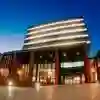



The way we communicate has the power to inspire, shift perspectives and drive action. It can change the way people see the world, but it can also be used to try to control ideas and opinions.
The BA English programme will help you to consider how literature and language can influence public opinion, and address current political, social and environmental challenges.
Your passion for reading and communication are at the heart of BA English at the University of Hull. We encourage you to value your own lived experiences, to explore how communication has impacted on these, and to connect them with those of people from diverse cultures and time periods.
You will be taught by experts in a region with a rich literary and cultural history. Renowned authors Andrew Marvell, Phillip Larkin, Stevie Smith, Tom Paulin, J.R.R. Tolkien, Winifred Holtby and Matt Haig, as well as film director Anthony Minghella, all have ties to both the University and the city.
About this course
On our BA English programme, you’ll study contemporary and international writing and communication, and how it links to past, present – and imaginary future – narratives.
With an array of modules, such as ‘Emotional and Artificial Intelligence’, ‘Prized Texts’, ‘Scandalous Lives’, ‘Movement and Migration’ and more, you’ll be able to follow your passions to create a personalised academic experience.
You will engage with a range of textual forms from manuscripts to printed works, from stage performances to films, and digital media. The nature of the ‘texts’ considered is wide-ranging and varied, including non-fiction forms, and this programme will encourage you to explore how ideas are communicated to and received by various public audiences.
Hull’s vibrant literary scene offers countless opportunities to showcase your unique voice. Join thriving societies, connect with leading authors, and gain hands-on experience designing, editing, and publishing work through our in-house magazines, Document 1 and Torchfire.
How are worlds shaped? With words.
Module options
Each year, you’ll study modules worth a certain number of credits, and you need 120 credits per year. Most modules are 20 credits – so you’ll study six modules each year. Some longer modules, such as a dissertation, are worth more. In these cases, you’ll study fewer modules - but the number of credits will always add up to 120. Some modules are compulsory, some are optional, so you can build a course that’s right for you.
Filters
Emotional and Artificial Intelligence
Explore two of the most critical issues of today: artificial intelligence (AI) and emotional intelligence (EQ). Learn to use generative AI tools like MS Copilot and critique their societal impacts, including challenges in academia and ethics. Explore EQ through literature and film, developing skills in empathy, critical thinking, and emotional management. Equip yourself for the future of work and life in an AI-driven world.
compulsory
20 credits
Just Read
Looking to develop your passion for reading? In this module, you’ll get the chance to work with tutors to create a personalised reading list, exploring texts that challenge and inspire you.
By analysing these texts and their historical contexts, you’ll improve your reading skills, deepen your understanding of literature, and enhance your critical awareness, while preparing for more complex concepts to come.
If you're ready to reconnect with literature and build the skills to thrive, this module is made for you.
compulsory
20 credits
Transforming Stories
Study key concepts like adaptation, appropriation, and intertextuality, examining how literature transforms existing stories. Explore texts like Ovid’s Metamorphoses, Chaucer, and Shakespeare to see how myths and narratives are reworked across time and cultures. This module incorporates feminist, postcolonial, and LGBTQ+ perspectives and encourages creating creative responses, blending English Literature and Creative Writing.
compulsory
20 credits
Global Voices
Explore global Anglophone poetry’s response to issues like the US Civil Rights Movement and South African Apartheid and gender and identity politics. Study poetry’s spoken forms, including metre, rhyme, and verse types such as sonnets and ballads. Investigate how poets worldwide use these forms to engage with historical and social contexts, challenging and reshaping poetic expectations.
compulsory
20 credits
Performing Identity
Explore evolving notions of identity through drama, focusing on gender, race, sexuality, and intersectionality. Examine how plays reflect and challenge societal norms from contemporary texts to ancient Greece and Shakespeare. Develop skills in dramatic analysis, gain insights into the relationship between self and society, and explore gender equality barriers.
compulsory
20 credits
Young Adult Fiction
Delve into genres like science fiction, fantasy, romance, and realism. Examine how young adult fiction addresses real-life issues such as gender, sexuality, and racial justice, helping readers navigate their identities. Understand how young adult fiction shapes visions of the future, and its appeal to both young and adult audiences.
compulsory
20 credits
Green Thoughts, Blue Stories: Literature and the Environment
Explore environmental issues, focusing on 'green' (land) and 'blue' (sea) themes. Analyse Anglophone eco-writing, including Native Indian and Indigenous perspectives, and texts on pollution, climate change, and sustainability, such as Juliet Blaxland’s The Easternmost House and W. G. Sebald’s Rings of Saturn. This module fosters cross-cultural and creative approaches to global environmental crises.
compulsory
20 credits
Networked Societies: Communication and culture in the Internet Age
Few aspects of contemporary life are untouched by the Internet, but the all-pervasiveness of digital networks does not mean they are easy to understand. This module offers tools and case studies to help you think more clearly and ask better questions about our networked societies.
compulsory
20 credits
Scandalous Lives
This module explores writers and texts variously described as 'scandalous', focusing on themes including adultery, coercive control, and crime. Analyse works addressing maternity, authority, and complex familial relationships to understand changing perceptions of scandal. Spanning various genres and periods, the module invites you to reflect on contemporary and historical understandings of scandal and how literature challenges and redefines societal norms.
compulsory
20 credits

Who decides the must-read books? You do.
Featured module
- compulsory
- 20 credits
Looking to develop your passion for reading? In this module, you’ll get the chance to work with tutors to create a personalised reading list, exploring texts that challenge and inspire you.
By analysing these texts and their historical contexts, you’ll improve your reading skills, deepen your understanding of literature, and enhance your critical awareness, while preparing for more complex concepts to come.
If you're ready to reconnect with literature and build the skills to thrive, this module is made for you.
Our facilities

Watchlist
Your course in their words
Student Story
2 mins
Your course in their words
Student Story
2 mins
Life on campus
University life
2 mins
Teaching Facilities
University life
2 mins
Featured academics
You’re taught by internationally-renowned scholars, published poets, fiction writers, and scriptwriters. People who bring their expertise, creativity and passion into everything you learn.
We’re part of the Larkin Centre research group. In REF 2021, 93% of our research was ranked world-leading or internationally excellent.2

Dr Catherine Wynne
Reader in Victorian and Early Twentieth-Century Literature and Visual Cultures
Catherine has contributed to TV and radio programmes on Bram Stoker and Arthur Conan Doyle for Channel 4, BBC TV, BBC radio, and Irish Radio. She was also a guest expert on Bram Stoker at a British Library event.

Dr Richard Meek
Lecturer
Richard's research interests include Shakespeare and the history of emotion. He gave the opening keynote lecture at the ARC Centre of Excellence for the History of Emotions conference 'Hamlet and Emotions: Then and Now' in Perth, Australia.
Entry Requirements
What do I need?
This course is currently available through Clearing, which means our entry requirements are a bit different to what they would normally be.
At Hull, you're a name not a number. During Clearing, we look at all of your qualifications and experience, not just your academic grades. We may be able to offer you a place whatever your situation. Get started by completing our eligibility checker, and find out immediately if you could study at the University of Hull.
Have questions? Our admissions team will be happy to help.
Fees & Funding
How much is it?

Future prospects
Hull counts poets Douglas Dunn and Roger McGough among its alumni. But an English degree doesn’t just pave the way for a literary career. It trains you to analyse, research and communicate at a very high level. It gives you the skills that are prized in many professions.
With this kind of grounding, you’ll gain the adaptability to flourish in many arenas. These may include more obvious paths, such as teaching or library and archive work. Or in any field requiring research skills and the ability to translate concepts into written or spoken forms, such as those needed by managers in any industry.
Become part of the next generation of futuremakers
Like what you've seen? Then it's time to apply.
The standard way is to apply through UCAS. This will give you the chance to showcase your skills qualities and passion for the subject, as well as providing us with your academic qualifications.
Not ready to apply yet?
Visit our next Open Day, and see all that the University of Hull has to offer. Talk to our lecturers about your subject, find out what university is really like from our current students, and take a tour of our beautiful campus and amazing facilities.
You may also be interested in...
93% employability (English) UK domicile full-time first degree leavers; Higher Education Graduate Outcomes statistics, for the academic year 2022/23, published by the Higher Education Statistics Agency June 2025.
Research Excellence Framework (REF) 2021.
English is ranked joint 3rd in the UK for Value Added Score. The Guardian University Rankings 2026.
All modules presented on this course page are subject to availability and this list may change at any time.